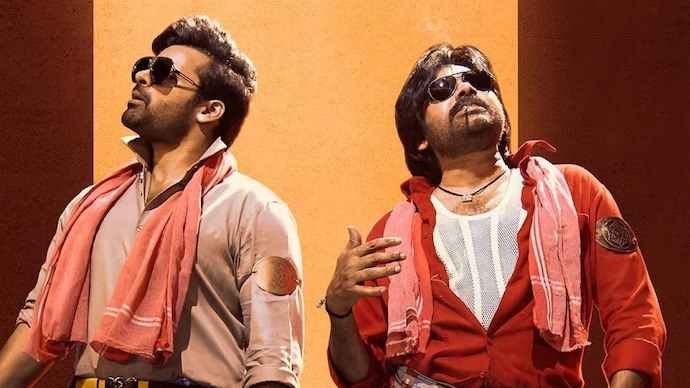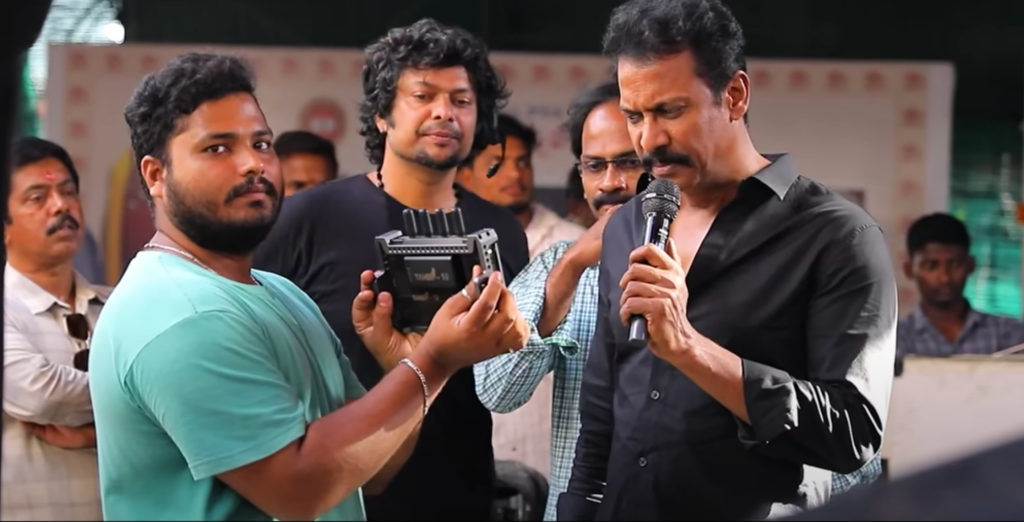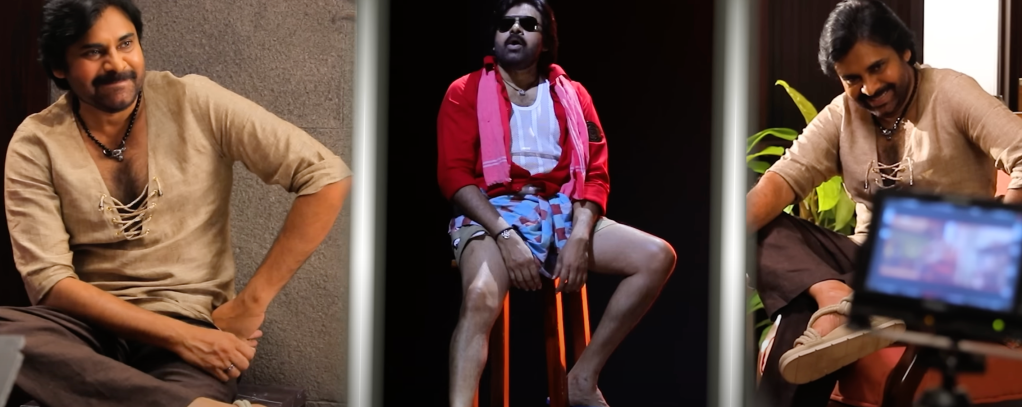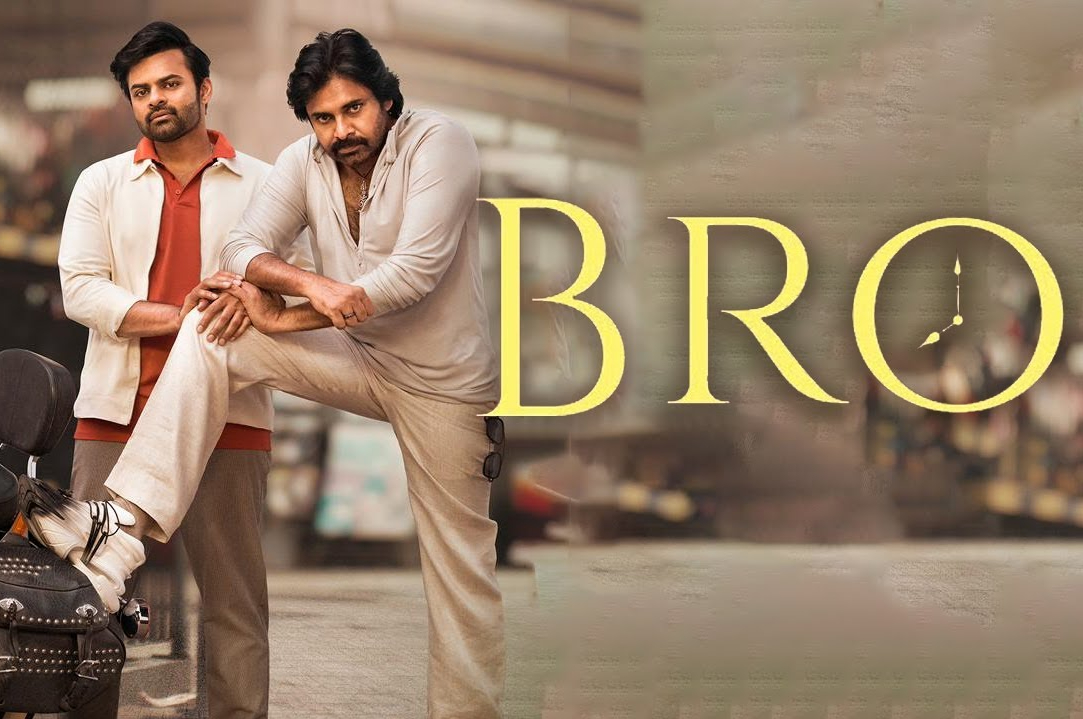2.75/5
When Pawan Kalyan releases a movie, it feels like a celebration of sorts. His insane fan following doesn’t have to be mentioned. Still, besides that, he also brings a specific infectious energy that’s only subject to his movies. Seated in a relatively large theater, many moments for me were drowned out in the screams of everyone-not just fans, mind you- celebrating the visceral presence that PK is.
At what point does a star become too big for his script? At what point does the star himself encapsulate the proceedings, leaving behind only crumbs of good filmmaking, even for good writing? At what point is there the restraint from filmmakers to remind actors, no matter how big, that cinema is the priority- not fan service? Filmmakers from TFI don’t know when to call this because it’s the easiest way to lead to a stream of collections. It would be a misstatement to say that catering to the fan leads to bad cinema because it is quite the entertaining experience, but there’s a tinge of disappointment; that these stars can do better scripts, even in the commercial space, without just going the easy way.
For me, Bro fits in this category. A good concept, already proven once in Tamil with the subtle yet effective Vinodhaya Sitham, remade to just become a homage to the actor Pawan Kalyan- in a movie starring Pawan Kalyan. It’s undoubtedly effective, setting the screens on fire, but a few years later, will it be remembered as a movie or just a fan appeal? Movies that appeal to the fan have their space in cinema, but when the film has just one message: “Jai PK,” it has the opposite effect.
PLOT:
Markandeya (Sai Dharam Tej) is a no-nonsense individual working as an AGM at People Textiles who rules his house with an iron fist. When a catastrophic event happens, he gets confronted by Kaalam (Pawan Kalyan) or Time. Time gives him another shot at life while taking him through the lives around him that he doesn’t know about. What Markandeya realizes and the journey he takes makes up the rest of the story.

WRITING:
The story, designed by Samuthirakani and co., goes along predictable lines but has a good message at the core of it; Live life without worrying about the next day, with the sole purpose of doing and being good. The concept is presented in a typical light with little depth in the proceedings. Not once do we get into the mind of Markandeya, or what he is feeling to mark (get it? 🤣) the story above and give it some bite than what we see on the surface. What we see on the surface fits the bill to an extent. There’s an attempt to slowly bring forward the change of the character, highlight the conversations between the characters, and ensure that the story ends on impactful but realistic terms. Simple setups, simple payoffs, simple filmmaking. A lot remains in the screenplay.
This is why this section is going to focus on how Trivikram, who adapted Ayyapanum Koshiyum into a commercially appealing Bheemla Nayak, has taken the concept of Bro, which Samuthirakani has shown how to showcase before, and makes it a PK fan mashup that essentially revokes all of the elements that somewhat make an effort to provide a convincing story. Trivikram has done the opposite; take Ayyapanum Koshiyum, a slow-burn dual character study, and change some elements to make it more commercial and racy. All said and done, this works in the end. Bheemla Nayak progresses entertainingly with hair-raising moments that have an effective flashback done relatively well with the symbol of Kokilli Devara. It changes the story to sensibilities, still something to be looked at, but ultimately works.
Bro doesn’t have this. Samuthirakani’s original screenplay details the story beat-by-beat and attempts for us to showcase some complexities in the simplicity of the premise in the end. Trivikram takes this and, in the name of originality, removes all of that for commercial elements and, most of all, PK fan service. The fan service works, but in the end, it sacrifices storytelling that leads us with nothing to go off of when we leave the theaters except the end message. What was Markandeya’s journey? What were his ramifications and his most significant challenges? So many important questions left still questions after the screenplay works its way.
The first half is living evidence of it. Tribute after tribute after tribute. Don’t get me wrong, they all hit the mark. Trivikram returns to the Akkada Ammaayi Ikkada Abbaayi, Kushi, and Tholi Prema days. He comes back all the way to the Jalsa and Bheemla Nayak days as well. The moment PK enters with a very famous Ramana Gogula song in one of his most iconic fits is crazy, and every reference works like that. Trivikram tries to fill this with situational comedic notes, but what good are comedy notes that evoke 1 or 2 chuckles when the plot is lost?
But I equate this to a bar playing your favorite songs. The bar will play the music, and you’ll get hyped, but it’s only a minute of various pieces strewn together. After a while, there isn’t any content, only”hype” in the form of multiple elements that mesh together to cater to a specific sector’s short-term sensibilities. Bro suffers from the same. Yes, the references are hype. But where is the storytelling? SDT’s intro before PK and how his scenes pan out after having no impact. They come, are hammed, and go. To introduce the following PK reference. One would equate this to Vakeel Saab, but at least Vakeel Saab kept to the core and pushed the plot forward through his references. Bro doesn’t do that.
The entire romantic track is crushed by the commercial pandering the writing does. SDT, Ketika, Mark, and Ramya are introduced, and we get to know they only spend a little time; PK is introduced, they meet, the cacophonous Jaanavule plays, and then Mark stops talking to her. Before we know why, how, or even where he does, another PK reference. Before we know it, Ketika disappears, and her arc is always incomplete.
Throughout this, PK’s energy keeps saving the script and the writing, which keeps pandering to him. The movie is about PK, the star, PK, the real-life persona, not PK, the character. Shame because despite Vakeel and Bheemla having a heavy emphasis on PK the star, there was a semblance of PK the character somewhere in there. Not in Bro, though. Trivikram tries to tie back the arcs, and he does for most of them, but some flail overall. The chemistry between PK and SDT is good to an extent, but we needed more of that.
Thankfully, Trivikram somewhat fixes his screenplay from the interval point to let the premise take over. We don’t get to know what the plot is until the interval. Still, we get our regular servings of emotional turns, conflict springings, those resolutions of the conflicts, and the message. It’s routine, but it works in the grand scheme of things as we get scenes that at least help us understand the plot.
Some scenes I really loved involved SDT and his redemption arc. We see scenes with SDT working hard in his childhood juxtaposed with SDT in his present day. It helps us understand that, despite the conflict, he still shares a deep relationship with his family, and they treasure him. I wish there was more of this subtlety that let us connect with Mark, the character, more.
With the writing, Trivikram panders completely to PK. Still, eventually, Samuthirakani’s premise holds some weight, with the climax done reasonably well. Even here, Trivikram’s screenplay could have been much sharper, especially by modifying scenes to increase the impact. Still, the ending works, and the message leaves us on a good note.

DIRECTION:
Samuthirakani’s direction is decent for the most part. The events present themselves in a way where the creative outlet of a director is limited. Still, the way Samuthirakani staged certain things, particularly the PK references, is perfect. With the PK references, Samuthirakani executes his notes well and makes every reference sparkle. He had only one goal, to bring out a fan-worthy PK and set them into a frenzy. In that goal, he does well. I enjoyed seeing some scenes, especially the entry and the fight scene, which, while unnecessary, work because of the Pawan Kalyan effect.
Ultimately, as a director, he keeps the movie entertaining. Despite the scenes not having any bite to them, Samuthirakani’s execution keeps them primarily light and fun so that we don’t feel weighed down by them. The proceedings come on the back of a decent narrative that takes its time and retains some elements of Vinodhaya Sitham in creating a cohesive storytelling effort. The tracks are well balanced, and some decisions, such as the contrasts between Markandeya as a kid and his contrast with his dad, work well. Comedically, as a director, he does well to have an undertone throughout the scenes. With PK’s sharp quips, his direction is complemented well.
However, there are some drawbacks too. Even with the scenes written well that attempt to tug at the heartstrings, Samuthirakani’s direction could be more precise. A scene in the second half comes to mind where SDT resolves his conflict with his second sister Veena (Priya Prakash Warrier). It conducts rather suddenly, and we see the transformation happen too quickly; I wanted Samuthirakani to slowly bring out the scene’s tension and then resolve it, subverting all expectations as the writing expects. But it happens rather predictably without a sense of buildup. This plagues Samuthirakani for many events; only a little can be done when the writing is formulaic, but the direction could have been much better.
Visually speaking, Samuthirakani also brings out the elements of time and God well. We see various clocks and allusions to Shiva, which helps to accentuate Samuthirakani’s attempts to bring us into the world of Bro, for the most part. Time being a significant visual metaphor throughout the movie is evident for the most part, and he succeeds in providing this aspect of visual storytelling throughout the scenes to accentuate the mystical element of the film. As NTR says in Nannaku Prematho, “Everything is interlinked,” and Samuthirakani certainly makes the audience try to believe so.
I wish there was more of an attempt to allow the audience to understand Markandeya and his life before introducing PK as the main act. It would have helped provide for the base the writing doesn’t offer. Still, even the scenes go by with such erratic pacing that we never know what’s truly happening in his life. With the writing being all over the place with the references too, the direction is also erratically paced throughout. Sometimes, exposition flies through, but sometimes it slows down to circulate around a few events with no reason. Just look at how the two sisters, Veena and Gayathri, get their arcs. Gayathri’s flies by, but Veena’s is-well- strained out.
Ultimately, Samuthirakani’s direction had one purpose, and he’s done that well- highlight PK and his real-life legacy of movies. The rest of the movie decently entertains despite its fair share of problems. Simplicity ultimately saves Bro; I never tried to explore much, so it’s a decent commercial flick.

PERFORMANCES:
PK, or Pawan Kalyan, oh man! Aside from all of the technicalities, he is the reason Bro is entertaining, and his energy elevates some scenes despite them technically not being the best. His swag and quips always work, he has this charm that he has yet to lose, and he executes all of his references with a level of freeness we haven’t seen. There aren’t many of his trademark dialogue delivery styles either, so even if he does recreate a lot of instances from his famous movies, there’s a fresh element to his performance too. A fan feast in and out is entertaining for the average viewer too. He dances pretty powerfully too. Sai Dharam Tej is very unconvincing. His expressions teeter from meme-inducing to overreacting, and in crucial moments he goes stone-faced. The accident did give him limitations, but that shouldn’t be an excuse after a certain point considering Virupaksha suffered from the same things. I appreciate that he is taking some time to improve his acting and fitness because he needs it given his drastically improved script selection. Nobody else gets much scope. Ketika Sharma is ok but disappears soon in the movie. Priya Prakash Warrier brings another thin role and does what she can. Tanikella and Vennela Kishore, same story. Bramhanandam is wasted. Rohini makes an impact with what she can get.

TECHNICALITIES:
Technicalities are mixed. Thaman’s songs are weak and honestly hinder in the proceedings, but his BGM is electric. The Bro theme mixed throughout works considerably in pivotal scenes and just generally. Maybe a bit weaker than Vakeel and Bheemla, but it fits the movie superbly. The cinematography is poor; random zoom-ins, below-average angles, and shaky scenes could have been much better. Dialogues by Trivikram are decent, but they have a fair share of his praasa. Editing is not bad in the movie. Production values need to improve; some scenes have a very cheap feel.

SUMMARY:
In the end, Bro has one job, and it does it well. I screamed and lost my voice whenever PK quipped a dialogue or executed a reference. As a movie, it gets tiring; paired with the incessantly weak writing and the direction that just goes along, Bro works more as a fan service than a movie. It has its moments towards the end and a good message. Still, the leading man of the moment, Pawan Kalyan, is what viewers should expect to receive when going in. Ultimately, Pawan Kalyan as a proper performer in cinema, is one of the most significant sources of entertainment, which Bro makes sure to provide ample of for the viewer.
